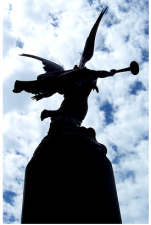by Nicole Neroulias
 A new study of Orthodox Christians in America has found a larger-than-expected number of converts, mostly from Roman Catholic and evangelical Protestant backgrounds.
A new study of Orthodox Christians in America has found a larger-than-expected number of converts, mostly from Roman Catholic and evangelical Protestant backgrounds.
The report, released by the Patriarch Athenagoras Orthodox Institute in Berkeley, Calif., surveyed 1,000 members of Greek Orthodox or Orthodox Church in America congregations, which represent about 60 percent of America’s estimated 1.2 million Orthodox Christians.
Although Orthodox churches were historically immigrant communities, the study found that nine out of 10 parishioners are now American-born. Thousands of members had converted to the faith as adults: 29 percent of Greek Orthodox are converts, as are 51 percent of the OCA.
“I would not have expected this many,”
said Alexei Krindatch, the Orthodox Institute’s research director.
“My sense was that in Greek Orthodox, it would be around 15 percent, and OCA maybe one-third.”
The study also found unexpectedly high numbers of converts among clergy — 56 percent in the OCA, 14 percent in the Greek Orthodox church. In both cases, the higher OCA numbers reflect that group’s use of English in its worship services, he added.
These findings could mean that Orthodox churches are growing in America, assuming there aren’t equal or greater numbers of Orthodox Christians leaving for other faiths; researchers won’t know until they conduct a 2010 membership census. The findings, however, indicate that other Christians are increasingly seeking a more traditional worship experience, Krindatch said.
“In the case of Roman Catholics, those are mainly people who are not quite happy with the reforms of the Second Vatican Council; they are looking for the Catholic Church as it used to be in the past,”
he said.
“In the case of evangelical Christians, those are people who have very strong personal beliefs, they know the Bible very well, they are frequent churchgoers, and eventually they want to join an established church with deep, historical roots.”
Compared to a 2005 study of American Catholics, the survey found more Orthodox Christians responding that they could not imagine belonging to another faith group, and fewer agreeing that how a person lives is more important than his or her religious affiliation.
“In all possible measures, belonging to a church is more important to Orthodox than Catholics,” Krindatch said.
The study’s other findings showed a majority of Orthodox Christians would support allowing married bishops, but not female priests. They also want their clergy to work with their Catholic and Protestant counterparts to coordinate a common date for Easter, which typically falls several weeks later for the Orthodox due to their use of an older liturgical calendar.

Leave a Reply